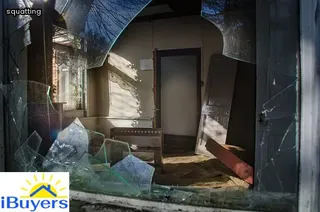Squatting is a term used to describe a person who occupies or takes possession of land or property without the permission of the legal owner. It is an illegal act, but can have a significant impact on land ownership and real estate.
Squatters will often take residence in abandoned buildings, or legally owned residential or commercial properties with no prior agreement between the owner and occupier. This means that although they are technically trespassing, they may be able to gain rights over time if they remain on the property for long enough.
This could give them access to things like water, electricity and even legal title over the land if certain criteria are met. In some cases, squatters may even be able to charge rent or receive compensation for improvements made to the property.
Although squatting is illegal, it does have an effect on land ownership and understanding your rights as a property owner is important when dealing with this issue.

Understanding the legal rights of squatters in different jurisdictions can be a complex task. Knowing where to look for information and how to interpret it is essential to understanding your rights as a squatter, no matter what jurisdiction you live in.
In some cases, squatters may even have certain legal protections that they can use in their favor. It's important to research laws and regulations governing squatting carefully, and to be aware of any changes that may affect those rights.
Different countries and states have different sets of laws when it comes to squatting, so it's important to understand the nuances of each jurisdiction before trying to exercise any legal rights you may have. Additionally, local ordinances and court decisions can have an impact on your squatting rights as well, so it's important to stay up-to-date on current events related to squatting in your area.
With thorough research and an understanding of the legal landscape, you'll be able to better comprehend your own rights as a squatter and make informed decisions about how best to protect yourself legally.
Squatters' rights to property and real estate vary from state to state in the United States. In general, squatters are people who take possession of a piece of property or land that they do not own and are not paying rent on.
Squatting is an old practice, but it has become more popular in recent years as housing prices have risen, leaving many people with limited choices when it comes to finding affordable housing. The laws regarding squatters’ rights vary widely across the country, with some states offering greater protections for squatters than others.
While some states may provide no protection whatsoever for those living on someone else's land without permission, other states may offer certain legal rights to squatters under certain circumstances. It's important to understand the laws in your particular state before engaging in any kind of squatting activity, as this could potentially lead to serious legal repercussions if you're found guilty of trespassing or breaking other laws.

Determining whether or not you have a squatter on your property is an important part of understanding your rights as a real estate owner. It's essential to be aware of the laws surrounding squatting in order to remain compliant and protect yourself from any legal issues that may arise.
The first step is to understand what qualifies an individual as a squatter under the law: they must occupy the property without permission or payment, must be living there for an extended period of time, and must have taken steps to establish their presence on the property, such as changing locks or making repairs. Once you are aware of these criteria, it is important to look for signs that someone may be squatting on your property, such as strange vehicles parked nearby or unfamiliar visitors at odd hours.
Additionally, if you are receiving mail addressed to someone else at your address, this could indicate that someone is using your property without permission. If you suspect a squatter has occupied your property, it is important to contact the police and seek legal counsel in order to ensure your rights are protected.
If you are a homeowner or property manager who has a squatter on your property, there are risks associated with allowing them to stay. These risks can range from legal to financial in nature.
In terms of the law, squatters may be able to establish legal rights if they remain on a property for long enough. This is known as adverse possession and could result in the squatter being able to claim ownership of the property after a certain period of time.
There are also financial risks related to tolerating a squatter on your property. For example, if any damage is caused by the squatter while they are living there, you may be held financially responsible for it.
Additionally, if the squatter has access to utility services such as electricity or water, you may end up footing their bill which can add up quickly and become very expensive. It is important to understand these risks before deciding whether or not to tolerate a squatter on your property.

When it comes to understanding how to regulate or remove a squatter from a property, there are several strategies that can be employed. One of the most effective methods is to file an eviction notice with local authorities, as this legally notifies the squatter that they must vacate the premises.
Additionally, sending a written warning can be used to inform the squatter that their presence on the property is unwelcome and that if they do not leave, further legal action will be taken. In some cases, it may be necessary for the owner of the property to get a court order requiring that the squatter vacate in order for them to comply with this request.
Furthermore, informing local police that there is an unauthorized person on your property may result in law enforcement intervening and removing the individual from your premises. Lastly, offering money or other forms of incentives can sometimes encourage squatters to willingly move out without resorting to legal action.
Ultimately, using any combination of these strategies can assist those looking to understand their rights when dealing with squatters in real estate.
When it comes to understanding squatters' rights in real estate, it is important to know the conditions of tenancy for a squatter. To be classified as a squatter, the individual must occupy a property with no permission from the owner or legal tenant and must demonstrate an intent of possession and control of the premises.
The occupant also cannot have paid rent or any other form of payment to reside on the property. In some cases, if squatters have been living on the property for a certain length of time, they may be able to establish legal possession through adverse possession laws.
However, this is not always the case and will depend on local statutes and regulations. Additionally, many states do not recognize squatters' rights and may require them to leave immediately or face criminal charges.
It is essential that both landlords and tenants understand their respective rights when it comes to dealing with squatters in order to protect themselves from potential legal issues.

When it comes to dealing with a squatter on your property, it is important to weigh the pros and cons before making a decision. On one hand, allowing the squatter to remain may provide you with some financial relief as they may agree to pay rent or help maintain the property in exchange for living there.
On the other hand, squatters are often seen as a nuisance who can cause damage to the property and create tension between you and your neighbors. Moreover, if you allow them to stay on your property for an extended period of time, they may gain legal rights that will make them difficult to remove and could lead to potential legal issues down the road.
Therefore, it is essential for real estate owners to understand their rights when dealing with a squatter before making any decisions about allowing them to stay on their property.
Adverse possession is a legal concept that can apply to squatters' rights in some cases. It is a doctrine that allows someone who has been in continuous, open, and hostile possession of real estate for a certain period of time to obtain title to the land.
To qualify for adverse possession, the squatter must demonstrate that they have had the land under their control for an extended period of time and have paid taxes on it if required. In addition, they must have had exclusive possession of the land with no permission or consent from the current owner, who must be notified at least once.
If all of these criteria are met, then adjudication of title may be granted to the squatter. Adverse possession is not legally applicable everywhere, as each state has its own set of laws governing this issue and it often varies from case to case.
It is important to understand how adverse possession applies in your particular jurisdiction in order to determine whether it could be used as a basis for squatters' rights.

Squatting is a complex issue, and there are many misconceptions about it that can have a great impact on land ownership. One of the main misconceptions is that squatting is illegal and punishable by law.
This is not true in most cases, as squatting may be allowed depending on the local laws and regulations. Another common misconception is that squatters are automatically granted ownership rights to the property they occupy without any legal paperwork or other requirements.
In reality, squatting does not guarantee any kind of rights over the property, and it may even result in fines or jail time if certain conditions are not met. It’s also important to understand that squatting will not make you the rightful owner of a property; instead, it gives you temporary occupancy until other arrangements can be made.
Finally, some people believe that if they squat for long enough, they will eventually gain full control over the land; however, this isn't true either since remaining on someone else’s property without their permission could still lead to legal repercussions.
In order to establish appropriate legal action against trespassing or unauthorized use of property, it is important for real estate owners to understand their rights and the available options. Federal, state and local laws all provide different levels of protection for property owners when it comes to squatters.
Depending on the jurisdiction, a landowner may be able to pursue various civil remedies such as an eviction lawsuit, or criminal charges including burglary and trespass. A landlord may also have the right to file a nuisance complaint if squatters are causing a disturbance on the premises.
Additionally, certain jurisdictions may offer relief through specific ordinances that require the owner of a building or vacant lot to secure the property with locked doors or other barriers. Understanding these legal remedies can help ensure that real estate owners take swift and effective action against those who are illegally using their properties.

Local laws regarding squatters' rights vary greatly from state to state and even locality to locality. It is important to understand the laws in your area when it comes to dealing with unwanted individuals on your property.
Some localities may provide more protection for squatters than others, so it is important to be aware of these distinctions. For example, some states may require a certain amount of time before an individual can be considered a squatter, while other states may provide no legal protection at all.
In addition, some cities or counties may have specific rules about how landlords must respond to unauthorized occupants on their property. Furthermore, there are also federal protections that may apply in some cases, such as those related to disability discrimination or military service.
No matter what the situation is, it is essential for landlords and homeowners alike to be informed of the local laws concerning squatters' rights in order to protect themselves from potential risks associated with having unauthorized individuals on their property.
When it comes to squatters' rights, authorities can legally remove a squatter from occupied property, but only under certain conditions. The laws will vary depending on the jurisdiction, but generally speaking, the property owner must demonstrate that they have a legal claim to the premises, and that the squatter is occupying it without their consent.
Additionally, the law may require that the owner has made reasonable attempts to contact or serve notice to the squatter prior to taking any action. In some jurisdictions, an eviction order may be required to complete the process of removing a squatter from occupied property.
Ultimately, understanding local laws and regulations surrounding squatters' rights is essential for property owners who wish to lawfully protect their real estate investments.

In most cases, squatters are not legally liable to pay rent to the property owner. Squatting is an illegal practice, and squatters typically do not have any sort of legal agreement with the property owner.
However, some jurisdictions may require squatters to pay a token fee or court-ordered restitution for living on someone else’s land without permission. Additionally, if a squatter has been living on the property for a certain period of time, the property owner may be able to file for an unlawful detainer action, which could result in an eviction notice being served by law enforcement.
If the squatter does not leave immediately when served with an eviction notice, they may be responsible for paying back-rent as well as court and attorney fees. It is important for both landowners and squatters to understand their rights in order to protect themselves and avoid potential legal issues.
When dealing with an unwanted occupant, the first step in the eviction process is to obtain a court order. This is typically done by filing a complaint in the local court and serving the squatters with notice of the complaint.
The legal process can be lengthy, so it is important to understand any applicable state laws and regulations in order to ensure that all steps are taken correctly. Depending on the state, there may also be additional laws or regulations governing squatters' rights.
It is important to research these laws as well in order to determine what rights an individual may have as an unwanted occupant. After obtaining a court order, it may be necessary to hire a professional eviction service or law enforcement agency depending on the situation.
Lastly, if all else fails, it may be necessary to seek out legal counsel for advice on how best to proceed with the eviction process.

When reviewing cases involving disputes over access to or ownership of land, it is important to consider the rights of squatters in real estate. A squatter is someone who occupies a property without permission from the lawful owner and is not legally entitled to possession.
It is important to understand the legal implications for both squatters and landowners when these types of disputes arise. The law generally favors landowners, but there are exceptions in which squatters may be able to claim some rights.
It is essential that all parties involved are aware of their legal rights and obligations when dealing with any issue related to real estate or ownership of land. In addition, a comprehensive guide can provide valuable information on understanding squatter's rights, such as how they are established, what remedies are available for a dispute over access or ownership, and how the law applies in different scenarios.
Knowing one's rights before entering into a dispute can help ensure that all parties can reach an agreement that works best for everyone involved.
In order to gain a better understanding of the legal implications of squatting, it is important to examine the precedent set by prior court decisions regarding unauthorized persons' possession of land. There have been a number of cases in which the courts have had to rule on issues related to trespassers and possessory rights.
These cases have provided insight into when squatters may be legally able to possess land, as well as what rights they may or may not be entitled to. In most cases, courts have taken into account factors such as length of occupancy, usage of the property, and whether or not rent was paid for the space.
Knowing these details can help guide individuals in their own understanding of how squatters' rights are legally enforced in real estate matters.

The current state of legislation regarding unauthorized occupants has been undergoing significant change in recent years. As a result, understanding the rights of squatters is becoming increasingly important for those in real estate.
It is essential to account for the different laws in various jurisdictions when assessing the impact of new changes that apply to situations with unauthorized occupants. The recent amendments have shifted the balance between landowner and squatter rights, giving greater protection to those unlawfully occupying property.
Understanding these changes is key for any landlord looking to protect their interests and avoid potential legal disputes. This can be complicated but by taking into account all relevant legislation and making sure legal requirements are met, landlords can ensure they are prepared for any situation involving a squatter.
When evaluating strategies for dealing with an unwanted occupant on your property, it is important to understand the rights of a squatter. Squatters may have certain legal protections under state laws and local ordinances.
In some circumstances, such as when a squatter has been living on the premises for at least a certain period of time, they may have rights which cannot be denied by the owner. Eviction proceedings might be necessary in order to remove an unwanted occupant from your property, but there are other options that could be explored first.
Before resorting to legal action, it’s worthwhile to consider whether mediation or negotiation is possible if you are willing to reach an agreement with the squatter. You may also want to research whether financial compensation is permissible in order to incentivize them to leave voluntarily.
Ultimately, understanding how squatters’ rights work in tandem with your own can help you make the best decision for handling an unwanted occupant on your property.

Protecting your property from squatters is a critical part of being a homeowner. Squatters have legal rights to occupy someone else's property, so it is important to understand the laws and regulations governing squatters' rights in real estate.
The best way to protect your property from squatting is to be aware of the state and local laws that apply to you. In many states, there are specific steps you must take in order to legally evict a squatter from your property, such as formally serving them with an eviction notice.
In addition, you should post "no trespassing" signs on your land and keep records of any correspondence between yourself and the squatter. Additionally, if you know of any vacant properties near yours that could be attractive to squatters, it may be wise to inform their owner or landlord of the potential threat so they can take preventive measures.
Taking these proactive steps will help ensure that your home remains safe from unwanted occupants.